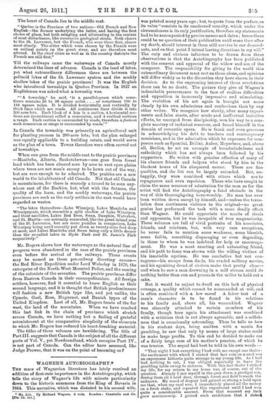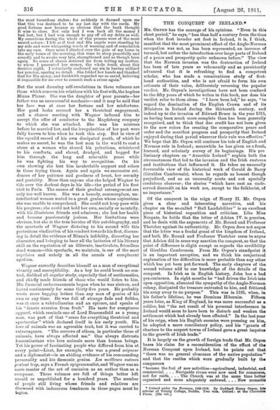WAGNER'S AUTOBIOGRAPHY.* True mass of Wagnerian literature has lately received
an addition of first-rate importance in the Autobiography, which tells the story of Wagner's life with minute particularity down to the historic summons from the Bing of Bavaria in 1864. This nai-rative, which was dictated to his second wife,
• Mg Life. By Richard Wagner. a yola. London ; Constable and Co. [8an. 6d. net.]
was printed many years ago ; but, to quote from the preface, as its value "consists in its unadorned veracity, which under the circumstances is its only justification, therefore my statements had to be accompanied by precise names and dates ; hence there could be no question of their publication until some time after my death, should interest in them still survive in our descend- ants, and on that point I intend leaving directions in my will." The only and obvious inference to be drawn from these observations is that the Autobiography has been published with the consent and approval of the widow and son of the composer. The responsibility for giving to the world this extraordinary document must rest on them alone, and opinions will differ widely as to the discretion they have shown in their decision. As to the engrossing interest of these revelations there can be no doubt. The picture they give of Wagner's indomitable perseverance in the face of endless difficulties and opposition is immensely impressive and stimulating. The evolution of his art again is brought out more clearly by his own admissions and confessions than by any other writer. We recognize how slowly, after many experi- ments and false starts, after crude and ineffectual imitative efforts, he emerged from discipleship, won his way to a com- plete mastery of technical resource, and found himself in the domain of romantic opera. He is frank and even generous in acknowledging his debt to teachers and contemporary musicians, and in the admiration which he expresses for com- posers such as Spontini, Bellini, Auber, Meyerbeer, and, above all, Berlioz, he set an example of broadmindedness and catholicity which has not always been followed by his supporters. He writes with genuine affection of many of his obscure friends and helpers who stood by him in the blackest hours of his chequered career. These are fine qualities, and the list can be largely extended. But, un- happily, they were combined with others which exalt) repugnance and even repulsion. Those who have sought to claim the same measure of admiration for the man as for the artist will find the Autobiography a fatal obstacle in the way of this thoroughgoing hero-worship. No man has ever been written down except by himself, and—unless the trans- lation does continuous violence to the original—no great genius has performed the task with a more deadly effect than Wagner. He could appreciate the merits of rivals and opponents, but he was incapable of true magnanimity.
These volumes are full of vivid portraits of his associates, friends, and relations, but, with very rare exceptions, he never fails to mention some weakness, some blemish, some foible, something disparaging or even degrading, in those to whom he was indebted for help or encourage- ment. He was a most exacting and exhausting friend, and his path to fame was strewn with the willing victims of his insatiable egotism. He was combative but not cou-
rageous—his escape from duels, his evaded military service, and his agonizing dread of cholera make that pretty clear—
and when he saw a man drowning in a mill stream could do nothing better than ran and persuade the miller to hold out a rake.
But it would be unjust to dwell on this lack of physical courage, a quality which cannot be commanded at will, and is often combined with a low moral A fairer test of a man's character is to be found in his relations to his family and, above all, his womenkind. Wagner was sincerely attached to certain members of his family, though here again his attachment was combined with a criticism that is not always agreeable, and a selfish- ness that is occasionally astounding. Thus he tells us how in his student days, being smitten with a mania for gambling, he saw that only by means of large stakes could he make large profits. To this end he decided to make use of a fairly large sum of his mother's pension, of which he was trustee. The sequel had best be told in his own words That night I lost everything I had with me except one thaler the excitement with which I staked that last coin on a card was an experience hitherto quite strange to my young life. As I had had nothing to eat, I was obliged repeatedly to leave the gambling table owing to sickness. With this last thaler I staked my life, for my return to my home was, of course, out of the question. Already I saw myself in the grey dawn, a prodigal son, fleeing from all I held dear, through forest and field towards the unknown. My mood of despair had gained so strong a bold upon me that, when my card won, I immediately placed all the money on a fresh stake, and repeated this experiment until I had won quite a considerable amount. From that moment my luck grew continuously. I gained such confidence that I risked
the most hazardous stakes : for suddenly it dawned upon me that this was destined to be my last day with the cards. My good fortune now became so obvious that the bank thought it wise to close. Not only had I won back all the money I had lost, but I had won enough to pay off all my debts as well. My sensations during the whole of this process were of the most sacred nature : I felt as if God and His angels were standing by my side and were whispering words of warning and of consolation into my ears. Once more I climbed over the gate of my home in the early hours of the morning, this time to sleep peacefully and soundly and to awake very late, strengthened and as though born again. No sense of shame deterred me from telling my mother, to whom I presented her money, the whole truth about this decisive night. I voluntarily confessed my sin in having utilized her pension, sparing no detail. She folded her hands and thanked God for His mercy, and forthwith regarded me as saved. believing it impossible for me ever to commit such a crime again."
But the most damning self-revelations in these volumes are
those which concern his relations with his first wife, the hapless Minna Planer. She was the daughter of poor parents—her
father was an unsuccessful mechanic—and it may be said that her face was at once her fortune and her misfortune.
Her good looks secured her a theatrical engagement, and a chance meeting with Wagner induced him to accept the offer of conductor to the Magdeburg company to which she was attached. She was his mistress before be married her, and the irregularities of her past were fully known to him when he took this step. But in view of the squalid record of his own dissipated youth, of which he makes no secret, he was the last man in the world to cast a stone at a woman who shared his privations, ministered to his comforts, and slaved, drudged, and begged for him through the long and miserable years while he was fighting his way to recognition. On his own showing she lent him incalculable support and solace
in these trying times. Again and again we encounter evi- dences of her patience and goodness of heart, her serenity
and geniality. More than anyone else she helped Wagner to tide over the darkest days in his life—the period of his first visit to Paris. The causes of their gradual estrangement are only too well known. She was a homely, commonplace, un- intellectual woman mated to a great genius whose aspirations she was unable to comprehend. She could not keep pace with his progress ; she could not hold her own, socially or mentally, with his illustrious friends and admirers ; she lost her health and became passionately jealous. Her limitations were obvious, but she is the true heroine of this autobiography, and the spectacle of Wagner dictating to his second wife this portentous vindication of his conduct towards his first, discuss- ing in detail the evidence of Minna's infidelity, dissecting her character, and bringing to bear all the batteries of his literary skill on the reputation of an illiterate, inarticulate, friendless dead woman—this spectacle, we maintain, is one of the most repulsive and unholy in all the annals of complacent egotism.
Wagner correctly describes himself as a man of exceptional vivacity and susceptibility. As a boy he could brook no con- trol, disliked all regular study, especially that of mathematics, and chiefly made friends of those who would listen to him. His financial embarrassments began when he was sixteen, and lasted continuously for some thirty-five years. He probably wrote more begging letters than any man of genies of his own or any time. He was full of strange fads and foibles, was at once a valetudinarian and an epicure, and speaks of his " innate aversion from fruit." His taste for sumptuous apparel, which reminds one of Lord Beaconsfield as a young man, was part of that " craze for everything theatrical and spectacular" which declared itself in his early youth. His
love of animals was an agreeable trait, but it was carried to extravagance. " The sorrows of others, in particular those of animals, have always affected me." One always distrusts humanitarians who love animals more than human beings. Yet his power of fascinating people who differed from him at
every point—Liszt, for example, who was a grand seigneur and a diplomatist—is an abiding evidence of his commanding personality and his daemonic genius. Les ineilleurs auteurs perlent trap, says a French epigrammatist, and Wagner was no more master of the art of omission as an author than as a composer. These volumes are full of things better left unsaid or unpublished for a hundred years. The number of people still living whose friends and relatives are discussed with indecorous frankness in these pages must be legion.



































 Previous page
Previous page